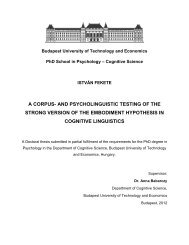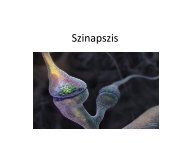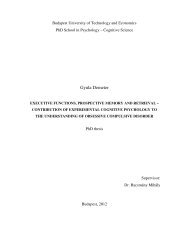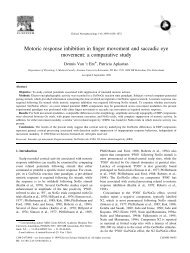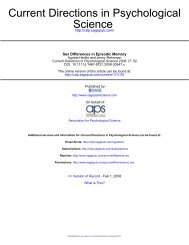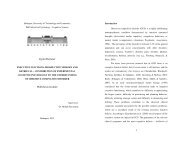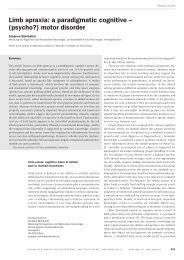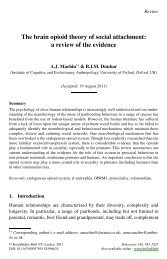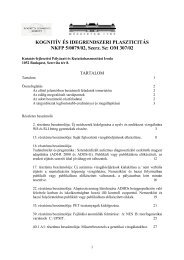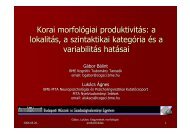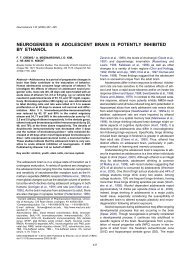Verbs: some properties and their consequences for agrammatic ...
Verbs: some properties and their consequences for agrammatic ...
Verbs: some properties and their consequences for agrammatic ...
You also want an ePaper? Increase the reach of your titles
YUMPU automatically turns print PDFs into web optimized ePapers that Google loves.
240<br />
Overall, these studies show that the problems <strong>agrammatic</strong>s encounter with verbs <strong>and</strong> <strong>their</strong> <strong>properties</strong><br />
have a spin-off on the production of other word-classes <strong>and</strong> that the characterization `problems<br />
with grammatical morphemes' is too general <strong>for</strong> telegraphic speech. q 2002 Elsevier Science Ltd.<br />
All rights reserved.<br />
Keywords: <strong>Verbs</strong>; Case; Negation; Agrammatism; Cross-linguistic research<br />
1. Introduction<br />
R. Bastiaanse et al. / Journal of Neurolinguistics 15 �2002) 239±264<br />
During the last decade, more <strong>and</strong> more has been published on the production of verbs,<br />
mainly at the word level �Miceli et al., 1983; Williams & Canter, 1987; Caramazza &<br />
Hillis, 1991; Jonkers & Bastiaanse,1996; Kim & Thompson, 2000).<br />
Recently, an overview of studies on verb retrieval at the word level was given by<br />
Kemmerer <strong>and</strong> Tranel �2000a,b). Like many others, they showed that action naming is<br />
in¯uenced by a huge number of factors <strong>and</strong> that these factors might affect individual<br />
aphasic patients differently. In daily life, however, we speak in sentences <strong>and</strong> it has<br />
repeatedly been shown that producing verbs in sentences is essentially different from<br />
action naming �Berndt, Mitchum, Haendiges & S<strong>and</strong>son, 1997; Bastiaanse & Jonkers,<br />
1998; Jonkers, 2000). <strong>Verbs</strong> play a central role in the sentence: they assign the thematic<br />
roles to the NPs, they express the relation between the event <strong>and</strong> time �by tense), in many<br />
languages they show which NP is the subject �by agreement in number <strong>and</strong> person) <strong>and</strong><br />
they assign case to the subject <strong>and</strong> object.<br />
Some of these factors have been shown to be impaired in <strong>agrammatic</strong> Broca's aphasics.<br />
Thompson et al. �1997) demonstrated that the number of arguments belonging to a verb<br />
<strong>and</strong> <strong>their</strong> optionality in¯uenced the retrievability. They reported that the dif®culty <strong>agrammatic</strong><br />
aphasics have with the retrieval of verbs increase with the number of arguments.<br />
This implies that a verb like to walk, that has no internal arguments, is easier to retrieve<br />
than to ®x, that has one internal argument, which is easier than to put that has two. Apart<br />
from that, the number of possible argument structures that belong to a verb in¯uences the<br />
ease with which it is produced: to ®x <strong>and</strong> to read both have one internal argument, but to<br />
read has two possible argument structures: one can say `he is reading' <strong>and</strong> `he is reading a<br />
book' <strong>and</strong> both sentences are perfectly grammatical as an answer to the question `what is<br />
he doing?'. To ®x has only one possible argument structure, in which the object is realized.<br />
*`He is ®xing' is an ungrammatical answer to `what is he doing?'; only `he is ®xing the<br />
car' is grammatical. Agrammatic aphasics are sensitive to this distinction: verbs with one<br />
possible argument structure are easier to retrieve than verbs with two or three possible<br />
argument structures. With respect to tense, Friedmann �2000) reported on in¯ectional<br />
problems with verbs in <strong>agrammatic</strong> aphasia in several languages: her patients are almost<br />
perfect at in¯ecting verbs <strong>for</strong> agreement, but they make errors when they have to in¯ect a<br />
verb <strong>for</strong> tense.<br />
The present paper deals with three phenomena related to verbs: ®niteness, case <strong>and</strong><br />
negation. These phenomena will be discussed within the framework of a linguistic theory.<br />
Three cross-linguistic studies will be presented to show that the problems <strong>agrammatic</strong><br />
speakers encounter with verbs have a spin-off on other grammatical notions that have been<br />
mentioned to be impaired in <strong>agrammatic</strong> Broca's aphasia.



